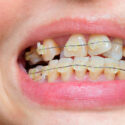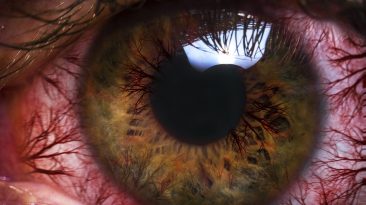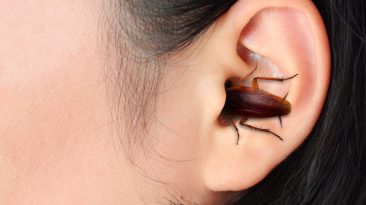How sick would you get if you never took your contacts out? You can probably imagine the discomfort that would come from leaving them in for days, but what about weeks, or months, or even years?
How much would you damage your vision? Could you lose your eyes? And why might it cause you to have diarrhea?
Contact lenses stay on your eyes by sticking to the thin layer of tear fluid found on the surface of the eye. This fluid is produced every time you blink, and it’s responsible for washing away any dirt that might become stuck to a lens.
If you were to wear your contacts while you sleep, there’d be no blinking going on to keep things clean. Bacteria would start to build up on the lens, and you’d wake up with stinging red eyes. And that would be just after day one! How much worse would things get?
The struggle of remembering to take out and clean your contacts every night is more common than you might think.
In the United States alone, approximately 30 to 45 million people wear contact lenses.
Most people wear them to improve their vision. Some people wear them to change their eye color, and some wear them for UV protection.
But no matter why you wear them, you still have to clean and disinfect them on a regular basis. And that’s where the danger would come into never taking your contacts out; it’s not the foreign object on your eye that would cause you the most problems, it’s what would be growing on that object.
If you never cleaned your contacts, then protein deposits, allergens and microorganisms would build up on the lens, leading to blurred vision. The bacteria building up on your eye could lead to something called keratitis; that’s an infection of the dome-shaped window of the eye known as the cornea.
In severe cases, keratitis can lead to corneal scarring, vision loss, and complete blindness. And even if you’re one of the lucky cases, you’d still be suffering from a sensitivity to light, redness of the eyes, tearing, and varying degrees of pain and discomfort.
Once symptoms started to appear, there’d be no turning back. Unless you remove your contacts, every day would be worse than the day before. You’d be constantly rubbing your red squinted eyes, suffering from headaches, and streams of uncontrollable tears would be gushing down your cheeks.
It’s safe to say that anyone who kept their contacts in all the time would be pretty irritable. Oh, and some of them could be pooping their pants too, but more on that in a second.
With all the chaos taking place in your eyes, you wouldn’t be able to drive, play sports, or read. Even your TV and computer screens would just be a big blur of colors.
Sure, you could just keep treating your eye infections with antibiotics, but that would have its own set of problems, since prolonged exposure to antibiotics can result in antibiotic resistance. The antibiotics could also disrupt the natural balance of good and bad bacteria in your body.
The good bacteria that help with our digestion could be obliterated, leaving the bad bacteria to take over our intestines. If this happens, you’re going to need to use your blurred vision to find a toilet quickly, because it usually results in extreme diarrhea. So, maybe you should just follow the instructions on your contacts and clean them regularly.
Subscribe to What-If on YouTube or follow the show on Facebook Watch.
Sources
- “Blindness and vision impairment”. 2019. who.int. Accessed November 24 2019.
- “Contact lenses that improve sports performance” Gary Heiting, 2019. allaboutvision.com. Accessed November 24 2019.
- “Contact Lens Fast Facts”. 2018. Centers For Disease Control And Prevention. Accessed November 24 2019.
- “Contact Lenses”. STEPHANIE WATSON, Howstuffworks. Accessed November 24 2019.
- “Contact Lens-Related Eye Infections”. 2019. American Academy Of Ophthalmology. Accessed November 24 2019.
- “Eye infection in contact lens wearers can cause blindness”. 2019. Sciencedaily. Accessed November 24 2019.
- “Is It Terrible to Wear the Same Contacts For a Long, Long Time?“. Miller, Korin. 2019. SELF. Accessed November 24 2019.
- “Non-Compliance With Contact Lens Wear And Care Practices: A Comparative Analysis”. Robertson, Danielle M., and H. Dwight Cavanagh. 2011. Optometry And Vision Science, 1. Ovid Technologies (Wolters Kluwer Health). doi:10.1097/opx.0b013e3182333cf9.
- “5 Unintended Consequences of Overusing Antibiotics”. 2019. Healthline. Accessed November 24 2019.



























